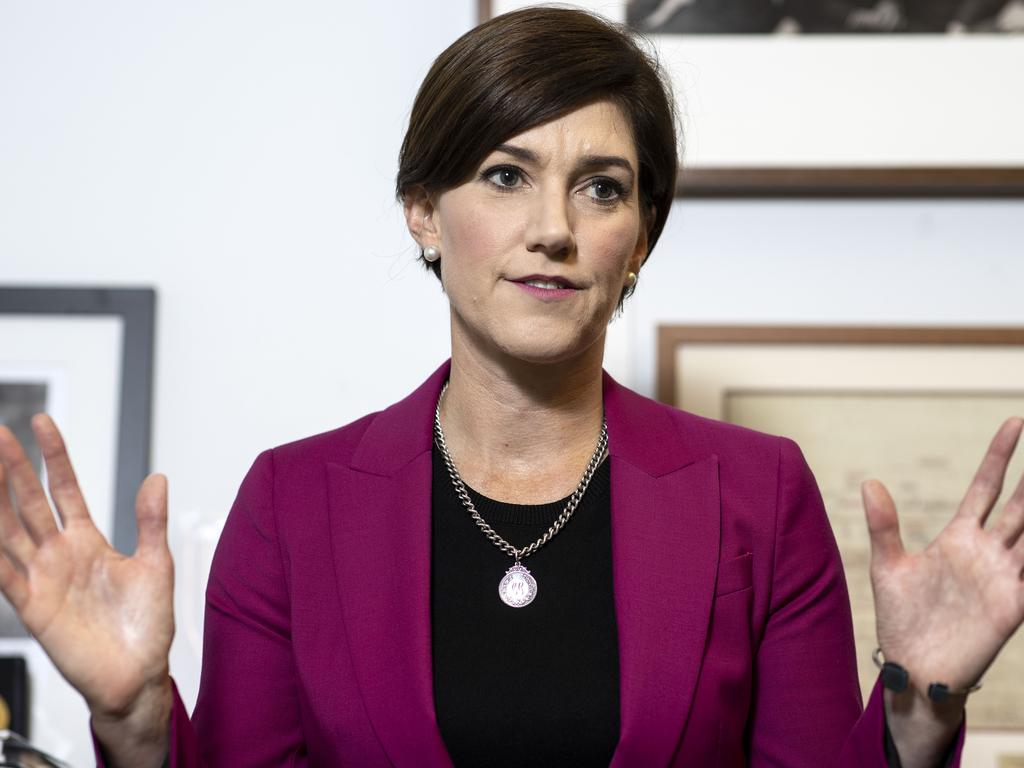
First, why are police not using existing laws to crack down on hate-filled, violence-inciting harassment? Second, will the courts interpret existing laws to cover this new world of online abuse – and if not, why not? Last, why aren’t political leaders doing more to condemn specific instances of online abuse in real time?
This past week for example, Scott Morrison and his ministers had a chance to show their conviction about cleaning up the online sewer. Yet they were oddly quiet in the face of vile attacks on Liberal MP Nicolle Flint by YouTuber Jordan Shanks-Markovina. It raises the prospect that these online reforms are a look-at-me exercise heading into an election. New laws won’t transform politicians into leaders with conviction.
It would be useful to know if police are investigating whether those demented online attacks by Shanks-Markovina are a breach of section 474.17(1) of the federal Criminal Code. And if not, why not?
That section makes it a criminal offence to use a carriage service in a way reasonable people would regard as menacing, harassing or offensive. The service includes a fixed or mobile telephone service, an internet service or an intranet service. In other words, it catches someone who posts menacing, harassing or offensive material on YouTube.
Reasonable people may well think Shanks-Markovina’s attacks fall squarely within this section. He describes the Liberal senator as “dick-hole Flint”, “a whiny little bitch”. He tells her to “f..k off” from politics. “How are you not the lowest form of life, Nicolle?” he says. And this: “I don’t hate you because you’re a woman. This goes far deeper than that. I hate you because you exist. Think about what a better world the world would be without Nicolle Flint.” There is more. But this is enough.
Some call this chap a political satirist. Not even close. Satire requires intellect and substance; it uses clever parody, a crafty turn of phrase. Shanks-Markovina’s YouTube post is a barrage of anger and hate towards Flint and other women.
Police also might consider that Shanks-Markovina has amassed 343,000 followers on his friendlyjordies Facebook page, and his YouTube video attacking Flint and others has attracted more than 238,000 views. It’s depraved enough that people, including women, who have praised his abusive behaviour towards women parade as progressives. But how many of them are also angry, crazy people who might act on Shanks-Markovina’s view that the world would be a better place if Flint did not exist?
If a person edges into the sometimes grey area of inciting violence, shouldn’t that be reason enough for police to prosecute?
Then we can learn what the courts make of section 474 in the context of growing online abuse. We know, from earlier cases, that the menacing, harassing, offensive conduct must be serious.
Man Haron Monis, the man who took hostages in a 17-hour siege at the Lindt Cafe at Martin Place seven years ago on Wednesday, had been charged with 12 counts of breaching a similar section that makes it a criminal offence to use a postal service to menace, offend or harass someone. Monis had sent offensive letters to relatives of some Australian soldiers killed during active service in Afghanistan. Monis’s lawyers argued the letters were protected by the implied freedom to political communication. The High Court ultimately split 3-3.
It’s not hard to imagine Shanks-Markovina launching a similar defence if charged under section 474. So, let’s have that play out. Then we might understand when this law can be used. Did Shanks-Markovina’s language reach the level of incitement? If so, how will the courts balance the implied freedom in the Constitution with language that incites violence? Judicial clarity is welcome.
The third plank rests with our politicians. How much better might our society be, in the real world and online, if leaders used their heft to confront online bullies. Name them. Call stumps on their disgusting behaviour. Defend those who are attacked, regardless of their political stripe.
Labor luminaries such as Kristina Keneally, Tanya Plibersek and other high-profile ALP politicians have appeared with Shanks-Markovina on his online shows. Kevin Rudd described him in November last year as a serious broadcaster. Therese Rein previously has tweeted support for Shanks-Markovina, too.
After the attacks on Flint, decent people who supported Shanks-Markovina would condemn his vicious attacks. Anthony Albanese was dragged into a tut-tut comment on Adelaide radio by Leon Byner. Plibersek posted a tweet. Both required a nudge.
Liberal leaders haven’t shone, either. The Prime Minister loves to front cameras sounding bolshie about bringing online bullies to heel. But he speaks in generalities. Why not use camera time to condemn Shanks-Markovina by name, to point out “enough is enough”, to make clear that Morrison has a woman’s back against this behaviour?
South Australian Liberal Premier Steven Marshall has been equally feeble. He is a prisoner of the wretched factional politics of the mediocre, where the first question is always: what faction are you in? What a foul state of affairs when the Premier won’t defend a fellow SA Liberal subjected to vicious online abuse.
What more would it take for Morison and Marshall to stand up and say this is not acceptable? If we want good people, normal people, to enter politics, it will happen only when these sorts of abusive, hateful, menacing attacks stop.
Others in the limelight could also condemn this man and his abuse. Grace Tame could round off her time as Australian of the Year by eschewing partisan politics to defend a woman in the face of these attacks. Because doing that, defending Flint, is the right thing to do.
To her credit Annabel Crabb did that. It didn’t matter that Flint had been critical of Crabb’s Ms Represented doco on the ABC. Crabb called bullshit on Shanks-Markovina’s attacks, fast and furiously. Crabb’s defence of Flint is the essence of decency and leadership in a world where both traits are in short supply. So, hold back on the excitement over online reforms. If leaders don’t defend Flint, they can hardly claim a genuine commitment to cleaning up the online sewer.








It’s sexy being a reformer at the cutting edge of tech regulation. But before we believe that a new batch of online reforms from the Morrison government will change the poisonous online culture, we need to understand three things.